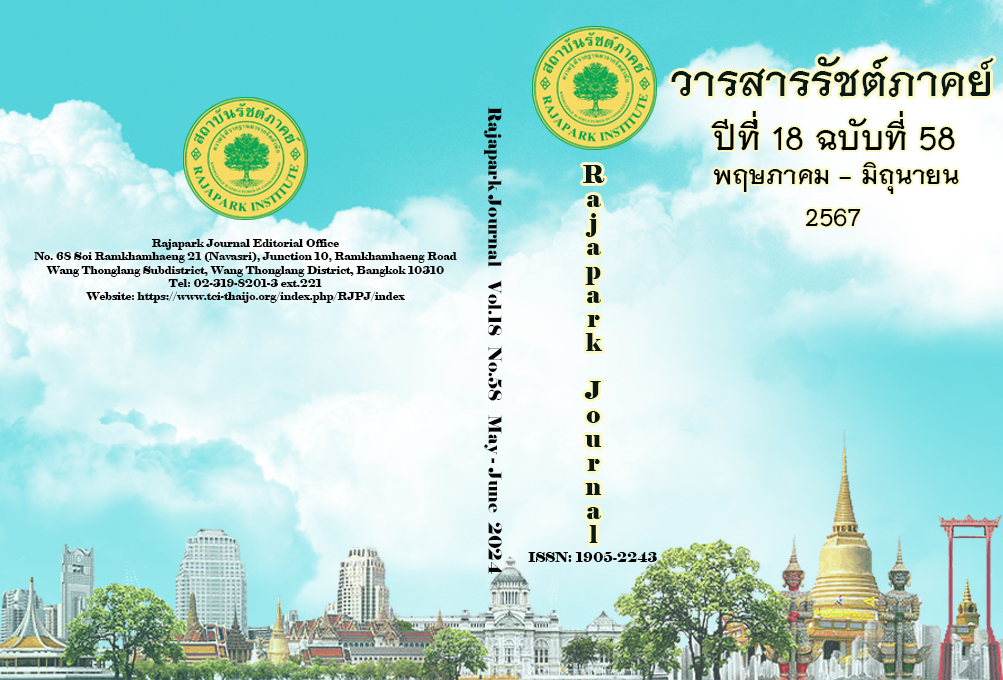The Professional Ethics Performance of Teachers in Basic Educational Institutions under the Office of Surin Primary Educational Service Area 3
Main Article Content
Abstract
The objectives of this research are: 1) Study the professional ethics performance of teachers in basic educational institutions under the office of Surin Primary Educational Service Area 3. 2) Compare teachers' practices in following the teaching professional code of ethics, classified by gender and academic status. 3) Study guidelines for promoting work performance according to teaching professional standards and teaching professional ethics. A sample group of 348 teachers was determined using Crezzi and Morgan tabulation and stratified random sampling. Proportionally, the data collection tool is a questionnaire. Data were analyzed using statistics: percentage, mean, and standard deviation. The research results found that 1) compliance with the teaching professional code of ethics is high in every aspect. It was found that the aspect with the highest average was ethics for professional associates, and the aspect with the lowest average value was social ethics. 2) The results of comparing the practices of teaching professional ethics classified by gender found that overall and in each aspect, they were not different. Classified by academic status, it was found that overall and in each aspect, they are significantly different at the .05 level. 3) Target group analysis results by triangulating showed that 1) on ethics towards oneself, the emphasis is placed on teachers developing themselves to have standards in their work. 2) On the ethics of the profession, the emphasis is placed on performance evaluation. 3) Ethics towards service recipients emphasizes improving the service system to be efficient. 4) The ethical standard for professional co-operators is that administrators adhere to the principles of fairness in management. 5) Ethics for society focus on participating in activities and giving opportunities for the community to participate in management to build strength in educational institution administration.
Article Details

This work is licensed under a Creative Commons Attribution-NonCommercial-NoDerivatives 4.0 International License.
Views and opinions appearing in the Journal it is the responsibility of the author of the article, and does not constitute the view and responsibility of the editorial team.
References
Al-Hothali, H. M. (2018). Ethics of the Teaching Profession among Secondary School Teachers from School Leaders' Perspective in Riyadh. International Education Studies, 11(9). 47-63. DOI: 10.5539/ies.v11n9p47
Joyner, S.K.S. (1999). An assessment of Georgia educators knowledge and understanding of their code of ethics[Doctoral dissertation, University of Available, Georgia].
Kasiban, S. (2016). Compliance with the teaching professional code of ethics of teachers under Phang Nga Municipality, Phang Nga Province[Master's thesis, Rajapark Institute].
Laehheem, N., & Wannapairo, S. (2018). The performance according to the teaching professional standard of the teachers under the Satun Primary Educational Service Area Office. In The 9th Hatyai National and International Conference, 2018, 20-21 July (pp. 1036-1047). Faculty of Business Administration, Hat Yai University. https://www.hu.ac.th/Conference/conference2018/proceedings/
Mangkang, P., Khamchai, P., & Boonprasert, A. (2019). Practice of Professional Ethical Standard of Teachers according to the First Year Students' Opinion of the Faculty of Education, Rajabhat Rajanagarindra University. Academic Journal of Phetchaburi Rajabhat University, 9(1), 147-155. https://journal.pbru.ac.th/onlinearticles.php?cid=8
National Education Act 1999. (1999, August 19). Royal Gazette. Volume 116, Chapter 74, pp.2.
Office of the Teacher Civil Service Commission and Educational Personnel. (2021, 22 July). OTEPC annual report 2021. Ministry of Education. https://otepc.go.th/th/content_page/item/3979-year2564.html
Phromarin, U. (2018). The performance abide by the code of ethics of the teachers in the public schools, the office of Phra Nakhon Si Ayutthaya Primary Educational Service Area 2[Master’s Thesis, Rajamangala University of Technology Thanyaburi].
Sapviriyakul, P. (2017). Conducting oneself according to the teaching professional code of ethics of teachers of the Saha School Group, Benjasiri Campus, under the Secondary Educational Service Area Office 2. Online Journal for Graduate Study, Faculty of Education (JGED). http://www.edu-journal.ru.ac.th/index.php/abstractData/viewIndex/401.ru
Secretariat of the Teachers' Council. (2006). Professional standards and professional ethics 2005. Teachers’ Council of Thailand Printing House, Ladprao.
Srichomphu, K., Thammarat, P., & Roipila, R. (2014). States and Needs for Self-Development of the Teachers at Centers of Sub-district Non-Formal and Informal Education under the Office of Sakon Nakhon Provincial Non-Formal and Informal Education. Journal of Educational Administration and Leadership, Sakhon Nakhon Rajabhat University, 3(9), 40-62. https://jeal.snru.ac.th/ArticleView?ArticleID=562
Surin Primary Educational Service Area Office, Area 3. (2019). Basic Education Quality Development Plan, Surin Primary Educational Service Area Office, Area 3 for the year 2020-2022. Surin Primary Educational Service Area Office, Area 3.
Teachers Council Regulations on Professional Ethics, B.E. 2013. (2013, 4 October). Royal Gazette.
Volume 130, Chapters Special 130 d. pp. 73.
Teachers Council Secretariat. (2012). Research report on professional standards for special education teachers. Teachers Council Secretariat.
Teachers Council Secretariat. (2013). Teachers Council Regulations on Professional Standards 2013. Teachers Council Secretariat.
Wangpian, N. (2012). The performance based-on teacher professional standards of the teachers in the schools under the Ratchaburi Primary Educational Service Area Office 1[Master’s Thesis, Pathum Thani University].


